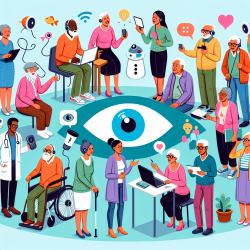As practitioners in the field of speech pathology and audiology, we are constantly seeking ways to improve our skills and better serve our clients. One often overlooked demographic that can benefit significantly from our expertise is the elderly. The research article "Communication Problems of the Elderly" by James N. Neelley provides invaluable insights that can guide us in enhancing our practice.
Understanding the Scope of the Problem
Neelley's research underscores that communication problems are frequent among the elderly, yet dependable data on the types and frequency of these issues remain scarce. Common problems include speech, language, and hearing impairments, which can severely impact the quality of life for older adults.
Key Findings and Recommendations
Here are some critical findings from the research that can help practitioners:
- Speech and Language: Intellectual decline associated with aging can affect communication. While not all elderly individuals experience this decline, those with higher intelligence levels tend to retain their abilities better.
- Acoustic and Perceptual Changes: Studies have shown that as men age from 50 to 85, there is a gradual increase in voice fundamental frequency and a slowing down in speaking rate. These changes are attributed to physiological and socioeconomic factors.
- Hearing Impairments: One of the most devastating sensory changes with aging is the reduction in hearing sensitivity. This often leads to withdrawal from communication, requiring significant effort to re-engage the individual in aural rehabilitation activities.
Practical Steps for Practitioners
Based on these findings, here are some practical steps you can take to improve your skills and provide better care to elderly clients:
- Conduct Comprehensive Assessments: Regularly assess the speech, language, and hearing abilities of your elderly clients. This will help in identifying specific issues and tailoring interventions accordingly.
- Engage in Continuous Education: Take courses that focus on the sociology, biology, and psychology of aging. This will enhance your understanding and effectiveness in dealing with elderly clients.
- Implement Rehabilitative Strategies: Utilize evidence-based rehabilitative strategies to address communication problems. This could include speech therapy, hearing aids, and other assistive technologies.
- Encourage Social Interaction: Facilitate opportunities for social interaction among your elderly clients. This can help in maintaining their interest in communication and improving their overall well-being.
Encouraging Further Research
While the existing research provides a solid foundation, there is still much to learn about the communication problems faced by the elderly. Practitioners are encouraged to engage in further research to fill the gaps in our understanding and improve the quality of care provided.
To read the original research paper, please follow this link: Communication Problems of the Elderly.










